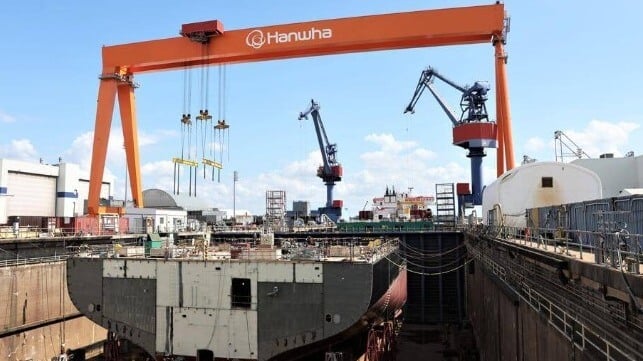Hanwha Philly to Build Nuclear-Powered Submarine for South Korea

The Trump administration has reached an unexpected agreement with the government of South Korea on sharing one of America's most closely-held capabilities - nuclear-powered submarine technology. During a visit to Gyeongju, President Donald Trump approved South Korea's request to begin making naval reactor fuel, useful for nuclear propulsion and nuclear weapons. In addition, Hanwha will build one or more nuclear submarines at Hanwha Philly Shipyard for delivery to the ROK Navy.
The existing U.S.-South Korean mutual defense pact places limits on Seoul's ability to use nuclear technology for defense applications, and the treaty would have to be amended to allow uranium enrichment above 20 percent U-235. American naval reactors run on uranium enriched to about 94 percent U-235 (weapons-grade), far above the treaty's limit. "If fuel supply is permitted, we can build several submarines equipped with conventional weapons using our own technology to defend the waters around the Korean Peninsula, ultimately reducing the burden on U.S. forces," said South Korean President Lee Jae Myung in remarks Wednesday.
Trump said later in the day that he had approved Lee's request to revise the accord. “Our Military Alliance is stronger than ever before and, based on that, I have given [South Korea] approval to build a Nuclear Powered Submarine, rather than the old fashioned, and far less nimble, diesel powered Submarines that they have now,” President Trump said in a statement on his social media platform. Transfers of U.S. Navy submarine technology to South Korea will also be involved.
The plan has parallels with the AUKUS arrangement with Australia and the UK, and has potential advantages for all parties. South Korea would get access to high-endurance, stealthy, nuclear-powered subs at a sensitive time in the East Asian security environment. Since the fuel agreement would produce high-enriched uranium, it could also be a stepping-stone towards a sovereign nuclear weapons program for South Korea, which is exposed to a growing nuclear threat from Pyongyang. For the U.S., the deal would mean another ally equipped with advanced submarine capabilities - a potential asset in the event of a conflict - and the development of a third nuclear-capable private shipyard on American soil.

that matters most
Get the latest maritime news delivered to your inbox daily.
"Through Hanwha Philly Shipyard and other investments and partnerships, a revived American shipbuilding sector will benefit U.S. workers, foster prosperity for both the United States and Korea, and enhance our nations’ shared security," said a Hanwha official in a statement to NBC.
In addition to the submarine agreement, Trump received confirmation of South Korea's plans to invest a total of $150 billion in U.S. shipbuilding over time. The official announcement included smaller initial commitments from all of South Korea's "Big Three" shipbuilders: HD Hyundai and Cerberus Capital Management will partner on a $5 billion investment program for modernizing American shipyards; Samsung Heavy Industries and Vigor Marine Group will work together on naval drydockings (MRO) and shipyard automation; and Hanwha Ocean will invest $5 billion in infrastructure and workforce development at Hanwha Philly.
